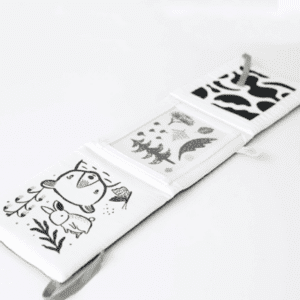As if there wasn’t enough to worry about as a new mom, you’re also expected to keep your eyes and ears open for product recalls to keep your baby safe from the mistakes manufacturers make. From car seats to cribs and toys, even the most trusted brands can sometimes release products with safety issues. We get it; everyone makes mistakes, but moms can’t be expected to keep up with all of them. So, we’re here to help be your eyes and ears. (Bookmark this page for easy access!)
Not every recalled baby product makes the headlines, so we’ve made it easier for parents and caregivers by rounding up recent recalls all in one spot. In this regularly updated blog, we cover the latest baby product recalls and what they mean for you. You can also always stay up to date by checking cpsc.gov/recalls for the latest info on recalls across all categories and age groups. Also, before you buy anything, it’s a good idea to visit saferproducts.gov. Here, people share safety concerns about specific products—even if something hasn’t been officially recalled yet, others might have had issues. (And hey, you can report your own concerns there too!)
Below are the latest baby product recalls (newest first).
Pearhead Infant Learning Toy Sets (model number 87150).
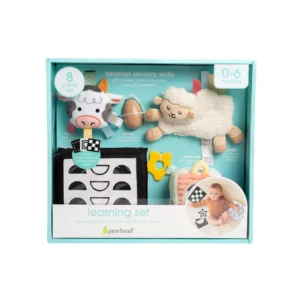 The 8-piece set includes a cow stroller toy, crinkle sheep toy, black and white tummy time book with flashcards, plush activity cube, and a wooden egg shaker rattle.
The 8-piece set includes a cow stroller toy, crinkle sheep toy, black and white tummy time book with flashcards, plush activity cube, and a wooden egg shaker rattle.
Hazard: The wooden egg-shaped rattle poses a choking hazard due to its size and shape, violating federal rattle regulations.
Incidents/Injuries or Possible Symptoms of Infection: None reported.
Safety Measures: Immediately stop using the egg shaker rattle.
Remedy: Free replacement and refund.
Refund: Contact Pearhead for instructions on returning the egg shaker and receiving a replacement and refund. Pearhead is also contacting known purchasers directly.
Contact: Pearhead toll-free at 888-308-4928 (Mon-Fri 9:30 am-6 pm ET), email at service@pearhead.com, or visit https://www.pearhead.com/pages/product-recall or www.pearhead.com (click “Recall”).
Source: U.S. Consumer Product Safety Commission (CPSC) Recall Number 25-115.
SHEIN EVERYDAY Kids’ Pajama Sets, sizes 8Y-12Y.
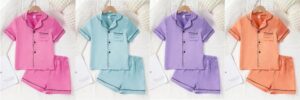
SKUS:
- Blue (SKU 2407018985445734)
- Pink (SKU 2407082184653588)
- Purple (SKU 2406274753471153)
- Orange (SKU 2404283444125106)
Hazard: Violation of federal flammability regulations (97% polyester, 3% elastane), posing a burn risk.
Incidents/Injuries or Possible Symptoms of Infection: None reported.
Safety Measures: Immediately stop using and take the pajamas away from children.
Remedy: Full refund.
Refund: Contact SHEIN for instructions on returning the pajamas and receiving a full refund. SHEIN is also contacting known purchasers directly.
Contact: SHEIN toll-free at 833-853-8668 (Mon-Fri 9 am-5 pm PT), email uscsteam@shein.com, or visit https://us.shein.com/campaigns/productrecalls or www.SHEIN.com (click “Product Recalls”).
Source: U.S. Consumer Product Safety Commission (CPSC) Recall Number 25-131.
UVIPC Baby Gates (Model W046) in white and black
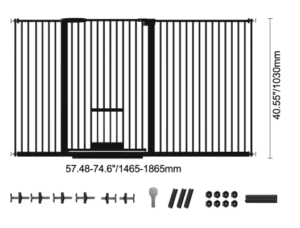
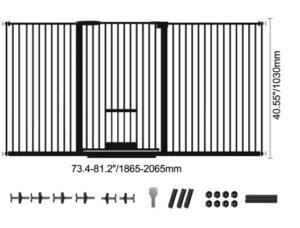
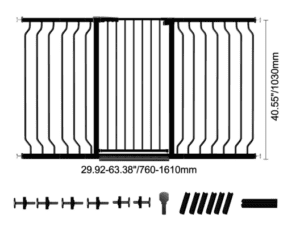
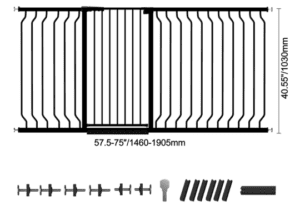
Four versions: two with pet doors (adjustable widths 57.5″-74.5″ and 73″-81″, both 40.5″ high) and two without (adjustable widths 30″-63.5″ and 57.5″-74.5″, both 40.5″ high).
Hazard: Violation of federal safety regulations for gates and enclosures.1 Entrapment hazard: child’s torso can fit through openings in the pet door versions or between the gate slat and side wall in other versions.2
Incidents/Injuries or Possible Symptoms of Infection: None reported.
Safety Measures: Immediately stop using the gates.
Remedy: Full refund.
Refund: Contact Xianshengyouli via email at xianshengyouli@outlook.com for disposal instructions and to submit proof of destruction for a full refund.3 Xianshengyouli and Amazon are contacting known purchasers.
Contact: Xianshengyouli at 626-529-6048 (Mon-Fri 10 am-5 pm PT) or email xianshengyouli@outlook.com.
Source: U.S. Consumer Product Safety Commission (CPSC) Recall Number 25-122.
Gerber® Soothe N Chew® Teething Sticks (Strawberry Apple, 3.2 oz; Banana, 3.2 oz & 1.59 oz), all lot codes
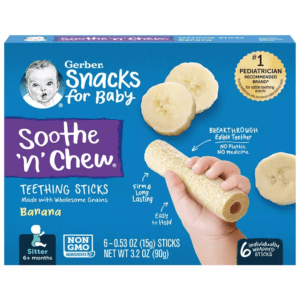
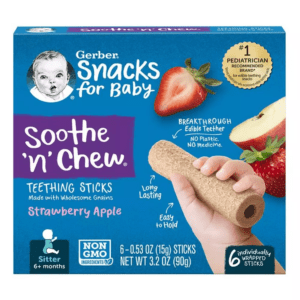
Hazard: Potential choking hazard for babies and young children.
Incidents/Injuries or Possible Symptoms of Infection: Consumer complaints of choking incidents, including one reported emergency room visit.1
Safety Measures: Do not feed the product to children.
Remedy: Refund.
Refund: Return the product to the retailer where purchased for a full refund.
Contact: Gerber at 1-800-4-GERBER (1-800-443-7237).
Source: FDA
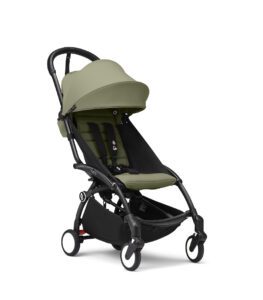
Stokke® YOYO3® 6+ Olive. Black Frame.
January 20, 2025: Stokke Yoyo3 travel strollers with serial numbers starting with “142AA” and followed by numbers below “0062239”
Hazard: The parking brake can disengage during use, posing a potential injury risk.
Incidents/Injuries or Possible Symptoms of Infection: No injuries reported.
Safety Measures: Immediately stop using the recalled strollers.
Remedy: Register your stroller for a full refund.
Refund: Full refund provided upon registration.
Contact: Visit https://recall.stokke.com/yoyo3 to register your stroller and initiate the refund process. You can also contact Stokke toll-free at 877-978-6553 from 9 a.m. to 5 p.m. Monday through Friday, email at consumer.usca@stokke.com, or visit www.stokke.com and click on “Product Safety and Recall Information” at the bottom of the page..
Source: U.S. Consumer Product Safety Commission (CPSC) and Stokke company announcements.
January 19, 2025: Wemfg Children’s Multi-Purpose Bike Helmets, model MD-710-S, size small (S)
Hazard: The helmets do not comply with federal safety regulations for bicycle helmets (positional stability, impact, labeling, and certification requirements). This poses a risk of head injury in a crash.
Incidents/Injuries or Possible Symptoms of Infection: No injuries reported.
Safety Measures: Immediately stop using the recalled helmets.
Remedy: Destroy the helmet by cutting off the straps.
Refund: Send a photo of the detached straps along with your Amazon order number to 961837339@qq.com for a full refund. Dispose of the helmet after submitting proof of destruction.
Contact: Wemfg via email at 961837339@qq.com, or through the Wemfg Storefront page or Seller Profile on Amazon.com.
Source: U.S. Consumer Product Safety Commission (CPSC) recall notice.
January 18, 2025: Ivy City Mini Bella Bunny Pajamas, Mini Camille Pajamas, and Mini Petra Nightgown (short and long sleeve) in various sizes
Product: Ivy City Mini Bella Bunny Pajamas, Mini Camille Pajamas, and Mini Petra Nightgown (short and long sleeve) in various sizes.
Hazard: Violation of federal flammability standards for children’s sleepwear, posing a burn risk.
Incidents/Injuries or Possible Symptoms of Infection: No injuries reported.
Safety Measures: Immediately take the pajamas away from children and stop using them.
Remedy: Destroy the garments by cutting them in half and disposing of them.
Refund: Contact Ivy City with a photo of the destroyed garment for a full refund.
Contact: Ivy City toll-free at 888-915-8609 from 9 a.m. to 4 p.m. MT Monday through Friday, email at hello@ivycityco.com, or online at https://ivy-city-co.gorgias.help/en-US/recall-information-936646 or https://ivycityco.com/ (click “FAQ” and then “Recall”).
Source: U.S. Consumer Product Safety Commission (CPSC) recall notice.
January 16, 2025: Babypark sling carriers.
The product was sold online at Shein.com from March through November 2024.
Hazard: Lack of structural integrity, posing a fall hazard to infants. The carriers also lack required warnings and instructions, violating federal safety requirements.
Incidents/Injuries or Possible Symptoms of Infection: Potential for infant falls and related injuries.
Safety Measures: Immediately stop using the sling carriers.
Remedy: Dispose of the sling carriers. Do not sell or give them away.
Refund: The seller has not agreed to a recall or offered a remedy. Contact Shein.com where purchased.
Contact: Report any incidents involving injury or product defect to CPSC at www.SaferProducts.gov. Contact Shein.com customer service for refund inquiries.
Source: U.S. Consumer Product Safety Commission (CPSC) product safety warning.
January 16, 2025: Fun Floating Bath Toy sold on the TEMU platform (barcode 2671457393)
Hazard: Choking hazard due to small parts (flippers) that can be swallowed by young children.
Incidents/Injuries or Possible Symptoms of Infection: Not specified, but the choking hazard poses a risk of serious injury or death.
Safety Measures: Immediately stop using the product and keep it out of reach of children.
Remedy: Discard the product.
Refund: Temu has contacted affected consumers and issued reimbursements.
Contact: Contact Temu’s Dedicated Customer Service team through the provided link on their platform for any refund issues or further questions.
Source: Competition and Consumer Protection Commission (CCPC) of Ireland.
January 14, 2025: Reckitt/Mead Johnson Nutrition (MJN) “Nutramigen Powder” Infant formula voluntary recall
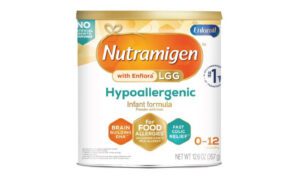
Product:
Nutramigen Powder, a hypoallergenic infant formula for babies with cow’s milk allergies.
- Sizes: All sizes ranging from 12.6 oz up to 19.8 oz cans
- Batches: Only UPC codes 300871239418 or 300871239456 (can be identified by the batch code on the bottom of the can.)
- Manufacturing: in June 2023 with a “Use By Date” of “1 Jan 2025”
- Distribution: Only products distributed in the U.S., mainly during June, July, and August 2023
Hazard:
Potential contamination with Cronobacter sakazakii bacteria. This bacteria can cause severe, life-threatening infections like sepsis or meningitis in infants.
Possible Symptoms of Infection:
- Poor feeding
- Irritability
- Temperature changes
- Jaundice (yellow skin and whites of the eyes)
- Grunting breaths
- Abnormal movements
Safety Measures:
- Immediately stop using the recalled product.
- Check the lot code on the bottom of the can. You can also enter the product lot code on the company’s website to verify if it’s included in the recall.
- Dispose the formula if it fits in the recall criteria.
- If you have fed your baby with a recalled batch, contact your healthcare provider if your baby has consumed the recalled formula and shows any signs of illness.
Refund:
Contact Reckitt/Mead Johnson Nutrition for a full refund or replacement.
Contact:
If parents have any questions, they should consult with their pediatrician or contact Reckitt/Mead Johnson Nutrition:
Phone: 866-534-9986 (24/7)
Email: consumer.relations@rb.com
Website: www.enfamil.com
January 13, 2025: Fisher-Price Baby Biceps Gift Set Voluntary recall
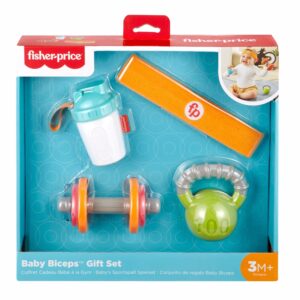
Product:
Plastic dumbbell toy included in the Fisher-Price Baby Biceps Gift Set (Model number GJD49).
Hazard:
Choking hazard.The dumbbell has a gray bar with orange and red plastic weights on each side that can detach.
Incidents/Injuries:
Seven reports of the dumbbell ends detaching. No injuries have been reported.
Safety Measures:
Immediately take the dumbbell toy away from young children and stop using it.
Remedy:
Dispose of the dumbbell toy according to the instructions provided by Fisher-Price.
Refund:
Consumers will receive a $10 refund for the dumbbell toy. Proof of purchase is not required.
Contact:
Visit the Mattel recall website at www.service.mattel.com/us/recall.aspx or www.service.mattel.com/us/recall.aspx for instructions on how to upload a photograph of the dumbbell toy and dispose of it properly.
January 13, 2025: Yaomiao Children’s Jewelry Sets Recall
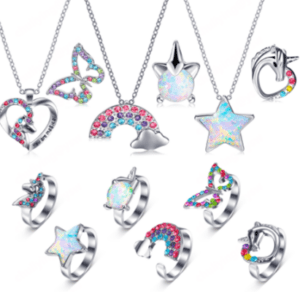
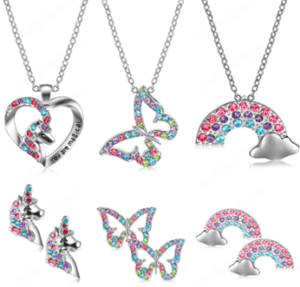
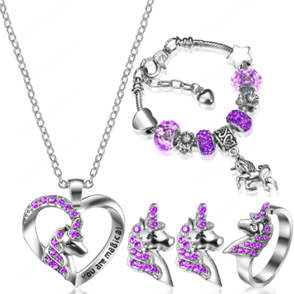
Product:
Yaomiao Children’s Jewelry Sets (approximately 6,900 sets sold in the U.S.) containing 3 to 12 pieces of silver-colored jewelry with multicolored gems in various shapes (unicorn, butterfly, etc.). Packaging: lavender box with “A Special Gift for the Charming You” and “Yaomiao” on the outer plastic wrap. Sold exclusively on Amazon.com from January 2022 through March 2024 for $8-$21.
Hazard:
Jewelry contains lead and cadmium levels exceeding federal safety standards, posing serious health risks, especially to children and pregnant or breastfeeding women.
Possible Symptoms of Infection:
Lead poisoning can cause a range of symptoms, including developmental delays, learning difficulties, irritability, loss of appetite, weight loss, sluggishness and fatigue, abdominal pain, vomiting, constipation, hearing loss, seizures, and eating things that aren’t food (pica).
Safety Measures:
- Immediately take the jewelry away from children and stop using it
- Consult your child’s healthcare provider for blood lead testing.
Remedy:
- Dispose of the jewelry set. Send photos of the disposed set to simlordroadple@163.com.
- Contact the seller for a full refund, LordRoads.
Contact:
- LordRoads: simlordroadple@163.com.
- Pennsylvania Department of Health Lead Information Hotline: 1-800-440-LEAD
December 20, 2024: Nuna Baby Car Seat Recall

Nuna Baby Car Seats produced between January 2023 and October 2024 are being recalled due to a defect in the harness adjuster mechanism, which could prevent the harness from tightening properly, posing a risk of injury to children in the event of a crash. The faulty harness system could cause the straps to become loose, compromising the car seat’s ability to properly secure the child.
To receive a replacement harness or a refund, contact Nuna directly at recall@nuna.com with the following information:
- Full name of the original purchaser
- Email address associated with the order
- Order number or proof of purchase
- Model and serial number of the car seat
- Photo of the batch code found on the underside of the car seat (near the label).
Learn more here: www.nuna.com/recall.
November 13, 2024: Kyte Baby Slumber Suits
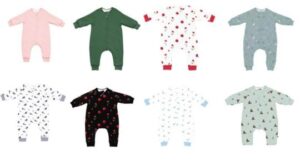 Kyte Baby Slumber Suits produced between November 2022 and March 2024 are being recalled due to a violation of federal flammability regulations for children’s sleepwear, posing a risk of burn injuries to children. Since they do not contain flame retardants, federal regulations require sleepwear to be tight-fitting for safety.
Kyte Baby Slumber Suits produced between November 2022 and March 2024 are being recalled due to a violation of federal flammability regulations for children’s sleepwear, posing a risk of burn injuries to children. Since they do not contain flame retardants, federal regulations require sleepwear to be tight-fitting for safety.
To receive a refund and to return your item, contact them directly at hi@kytebaby.com with the following information: Full name of the original purchaser; Email address associated with the order; Order number; Mailing address; and Photo of batch ID tag found at the interior seam (in MM/YYYY format). Learn more here.
October 30, 2024: Dynacare Baby Powder
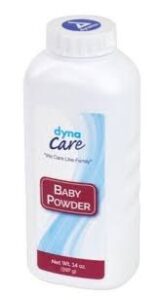 Montvale, New Jersey-based Dynarex Corp. on Monday said it was expanding a recall first announced in September to include an additional 1,020 cases of Dynacare baby powder because the 14-ounce and 4-ounce items could be contaminated with asbestos.
Montvale, New Jersey-based Dynarex Corp. on Monday said it was expanding a recall first announced in September to include an additional 1,020 cases of Dynacare baby powder because the 14-ounce and 4-ounce items could be contaminated with asbestos.
A known carcinogen, asbestos is a mineral that occurs naturally and is often found near talc, an ingredient used in many cosmetic products. The recall comes as a result of routine testing by the FDA, the company stated in its notice.
People who purchased the recalled baby powder should stop using the product and return it for a refund, Dynarex said. Learn more here.
October 17, 2024: Kindly Toys Busy Board toys
September 19, 2024: Wee Gallery Tummy Time Gallery
September 12, 2024: MJASKRE High Chairs
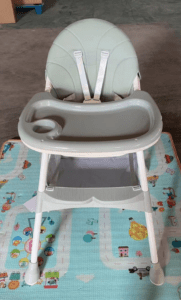 On September 12, 2024, MJKSARE high chairs were recalled due to safety concerns, including entrapment and fall hazards. The leg openings are too wide, posing a risk of entrapment, and the tray can detach, potentially causing infants to fall. About 4,760 model H-601 high chairs, sold exclusively on Amazon from February to March 2024, are affected. These green, foldable chairs feature a front tray with a cup holder, and the manufacturing date can be found on a tag under the seat padding. Consumers should stop using the chair immediately and contact TONGAO at gztaamz@163.com for disposal instructions and a full refund. Full recall details can be found here.
On September 12, 2024, MJKSARE high chairs were recalled due to safety concerns, including entrapment and fall hazards. The leg openings are too wide, posing a risk of entrapment, and the tray can detach, potentially causing infants to fall. About 4,760 model H-601 high chairs, sold exclusively on Amazon from February to March 2024, are affected. These green, foldable chairs feature a front tray with a cup holder, and the manufacturing date can be found on a tag under the seat padding. Consumers should stop using the chair immediately and contact TONGAO at gztaamz@163.com for disposal instructions and a full refund. Full recall details can be found here.
Additional Safety Tips for Parents
When it comes to baby product recalls, ensuring the safety of your child means staying informed and taking quick action. Here are some general safety tips to follow:
1 – Register Your Baby Products
- Always register new baby products with the manufacturer. Many products come with a registration card, or you can register online. This ensures you’ll be notified directly if a recall occurs.
2 – Check for Recalls Before Buying Second-Hand Items
- If you’re purchasing second-hand baby items (like high chairs, cribs, or strollers), check to see if they’ve been recalled. Avoid buying used items if they lack manufacturer labels or instructions.
- Be cautious when buying baby products from online marketplaces or garage sales, as these may include recalled or unsafe items.
3 – Avoid Buying Used Car Seats
- Crash history: There’s no way to know if a used car seat has been in a crash, especially if airbags were deployed. Even if there’s no visible damage, the seat could be significantly damaged.
- Recalls: There’s no way to know if a used car seat has been recalled without the model number and date of manufacture, which are usually on the labels.
- Expiration date: Without the date of manufacture, you can’t determine if the seat is past its expiration date.
- Missing parts: A used car seat might be missing parts.
- You know the seat’s full history and are certain it’s never been in a crash.
- The seat’s labels are intact and include the date of manufacture and model number.
- The seat isn’t past its expiration date.
4 – Inspect Products Regularly
- Even if a product hasn’t been recalled, inspect it regularly for signs of wear or malfunction. Loose screws, frayed straps, and small parts can become hazards over time.
5 – Beware of Counterfeit Products
- Always purchase from reputable retailers to avoid counterfeit products, which may not meet safety standards or could be more prone to defects and recalls.
6 – Spread the Word
- If you learn about a recall, inform other parents and caregivers. It’s challenging to keep up with the news and your warning could help protect a child from being injured.
In a world filled with endless baby products, keeping your little one safe can feel overwhelming. Staying informed about product recalls is a crucial step in protecting your baby from potential harm. Regularly check recall websites, do your research, and trust your instincts when it comes to the items you bring into your home. By staying vigilant and making safety a top priority, you can create a safer environment for your baby—and gain peace of mind along the way.

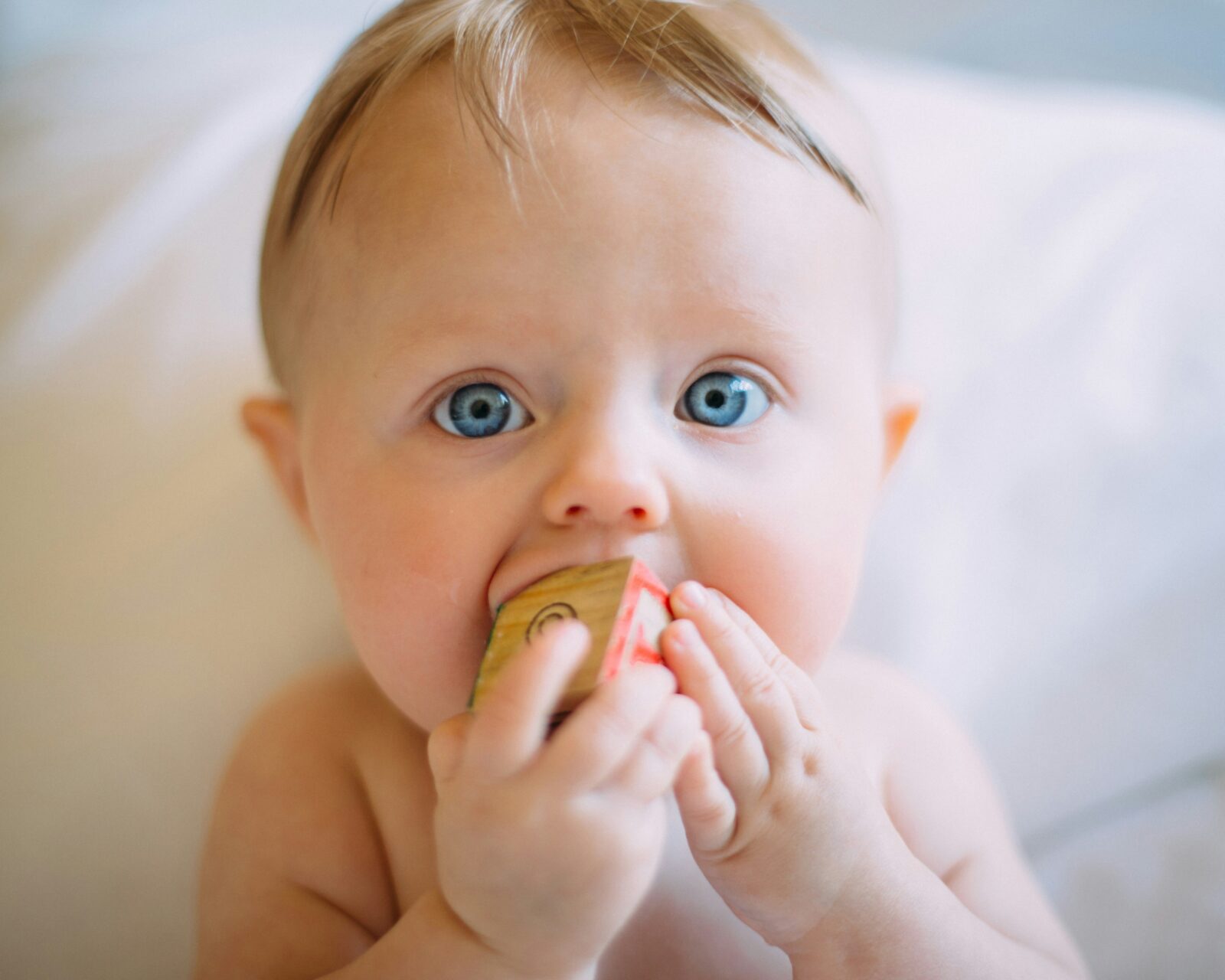
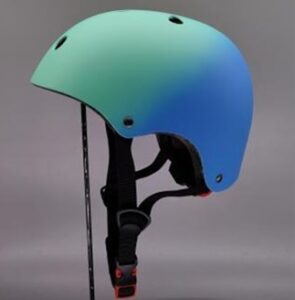

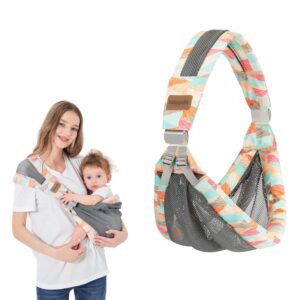
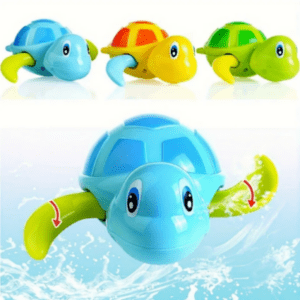
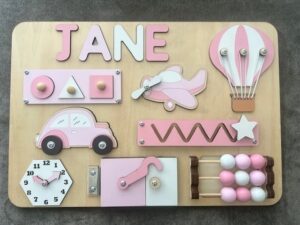 The
The 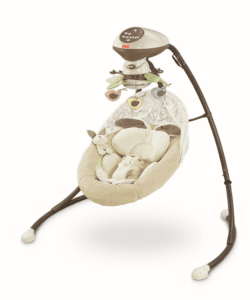
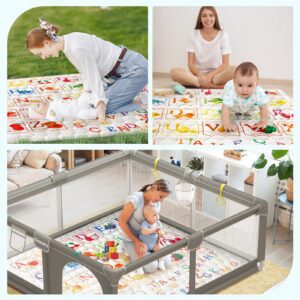
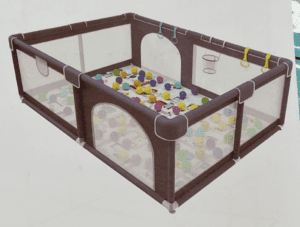 The U.S. Consumer Product Safety Commission (CPSC) is warning consumers to immediately stop using and dispose of LEHOM Baby Playpens because they pose entrapment and suffocation hazards for infants. The LEHOM playpens violate federal safety regulations for play yards because the included basketball hoop accessory presents a head entrapment hazard and in addition, children can become entrapped beneath the mattress, posing a suffocation hazard. Also, the zippers contain levels of lead that exceed the federal lead content ban and the PVC suction cups contain levels of phthalates that exceed the federal phthalate prohibition. Lead and phthalates are toxic if ingested by young children and can cause adverse health effects. The importer, RYZ International Trading Limited, of Hong Kong, has not agreed to offer an acceptable recall remedy to consumers. Learn more
The U.S. Consumer Product Safety Commission (CPSC) is warning consumers to immediately stop using and dispose of LEHOM Baby Playpens because they pose entrapment and suffocation hazards for infants. The LEHOM playpens violate federal safety regulations for play yards because the included basketball hoop accessory presents a head entrapment hazard and in addition, children can become entrapped beneath the mattress, posing a suffocation hazard. Also, the zippers contain levels of lead that exceed the federal lead content ban and the PVC suction cups contain levels of phthalates that exceed the federal phthalate prohibition. Lead and phthalates are toxic if ingested by young children and can cause adverse health effects. The importer, RYZ International Trading Limited, of Hong Kong, has not agreed to offer an acceptable recall remedy to consumers. Learn more 